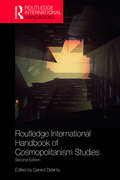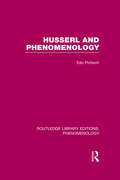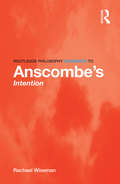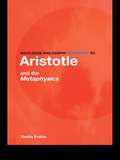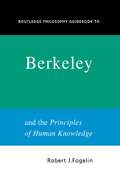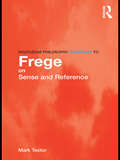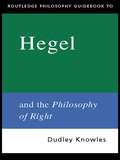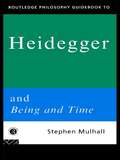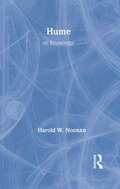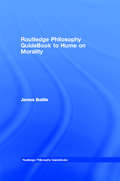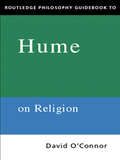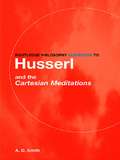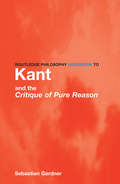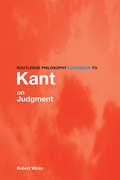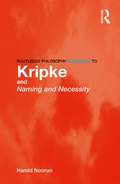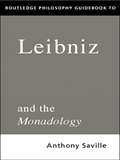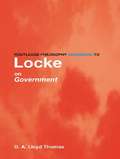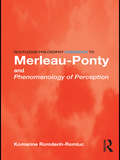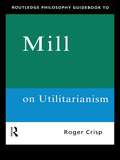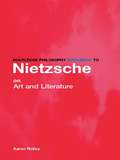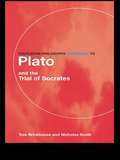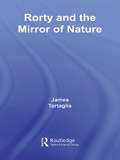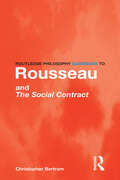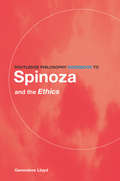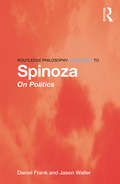- Table View
- List View
Routledge International Handbook of Cosmopolitanism Studies: 2nd edition (Routledge International Handbooks)
by Gerard DelantyCosmopolitanism is about the extension of the moral and political horizons of people, societies, organizations and institutions. Over the past 25 years there has been considerable interest in cosmopolitan thought across the human social sciences. The second edition of the Routledge International Handbook of Cosmopolitanism Studies is an enlarged, revised and updated version of the first edition. It consists of 50 chapters across a broader range of topics in the social and human sciences. Eighteen entirely new chapters cover topics that have become increasingly prominent in cosmopolitan scholarship in recent years, such as sexualities, public space, the Kantian legacy, the commons, internet, generations, care and heritage. This Second Edition aims to showcase some of the most innovative and promising developments in recent writing in the human and social sciences on cosmopolitanism. Both comprehensive and innovative in the topics covered, the Routledge International Handbook of Cosmopolitanism Studies is divided into four sections. Cosmopolitan theory and history with a focus on the classical and contemporary approaches, The cultural dimensions of cosmopolitanism, The politics of cosmopolitanism, World varieties of cosmopolitanism. There is a strong emphasis in interdisciplinarity, with chapters covering contributions in philosophy, history, sociology, anthropology, media studies, international relations. The Handboook’s clear and comprehensive style will appeal to a wide undergraduate and postgraduate audience across the social and human sciences.
Routledge Library Editions: Phenomenology (Routledge Library Editions: Phenomenology)
by VariousReissuing works originally published between 1970 and 1995, Routledge Library Editions: Phenomenology (14 volume set) offers a selection of scholarship covering this important branch of philosophy and method. Volumes cover theories of Husserl and Heidegger, and branch out to such topics as psychology, Marxism, language and emotion, and education, forming a varied and informative collection of previously out-of-print works.
Routledge Philosophy GuideBook to Anscombe's Intention (Routledge Philosophy GuideBooks)
by Rachael WisemanG. E. M. Anscombe’s Intention is a classic of twentieth-century philosophy. The work has been enormously influential despite being a dense and largely misunderstood text. It is a standard reference point for anyone engaging with philosophy of action and philosophy of psychology. In this Routledge Philosophy GuideBook, Rachael Wiseman: situates Intention in relation to Anscombe’s moral philosophy and philosophy of mind considers the influence of Aquinas, Aristotle, Frege, and Wittgenstein on the method and content of Intention adopts a structure for assessing the text that shows how Anscombe unifies the three aspects of the concept of intention considers the influence and implications of the piece whilst distinguishing it from subsequent work in the philosophy of action Ideal for anyone wanting to understand and gain a perspective on Elizabeth Anscombe’s seminal work, this guide is an essential introduction, useful in the study of the philosophy of action, ethics, philosophy of psychology and related areas.
Routledge Philosophy GuideBook to Aristotle and the Metaphysics (Routledge Philosophy GuideBooks)
by Vasilis PolitisAristotles' 'Metaphysics' is one of the most important texts in Ancient Philosophy. This GuideBook looks at the Metaphysics thematically and takes the student through the main arguments found in the text. The book introduces and assesses Aristotle's life and the background to the Metaphysics, the ideas and text of the Metaphysics and Aristotle's philosophical legacy.
Routledge Philosophy GuideBook to Berkeley and the Principles of Human Knowledge (Routledge Philosophy GuideBooks)
by Robert FogelinGeorge Berkeley is one of the most prominent philosophers of the eighteenth century. His Principles of Human Knowledge has become a focal point in the understanding of empiricist thought and the development of eighteenth century philosophy.This volume introduces and assesses:* Berkeley's life and the background to the Principles* The ideas and text in the Principles* Berkeley's continuing importance to philosophy.
Routledge Philosophy GuideBook to Frege on Sense and Reference (Routledge Philosophy GuideBooks)
by Mark TextorGottlob Frege (1848-1925) is considered the father of modern logic and one of the founding figures of analytic philosophy. He was first and foremost a mathematician, but his major works also made important contributions to the philosophy of language. Frege’s writings are difficult and deal with technical, abstract concepts. The Routledge Philosophy Guidebook to Frege On Sense and Reference helps the student to get to grips with Frege’s thought, and introduces and assesses: the background of Frege’s philosophical work Frege’s main papers and arguments, focussing on his distinction between sense and reference the continuing importance of Frege’s work to philosophy of logic and language. Ideal for those coming to Frege for the first time, and containing fresh insights for anyone interested in his philosophy, this Guidebook is essential reading for all students of philosophy of language, philosophical logic and the history of analytic philosophy.
Routledge Philosophy GuideBook to Hegel and the Philosophy of Right (Routledge Philosophy GuideBooks)
by Dudley KnowlesHegel is one of the most important figures in the history of ideas and political thought. His Philosophy of Right is widely recognised as one of the greatest works of political philosophy.Hegel and the Philosophy of Right introduces and assesses:* Hegel's life and the background of the Philosophy of Right* The ideas and text of the Philosophy of Right* The continuing importance of Hegel's work to philosophy and political thought.
Routledge Philosophy GuideBook to Heidegger and Being and Time (Routledge Philosophy GuideBooks)
by Stephen MulhallHeidegger is one of the most controversial thinkers of the twentieth century. A difficult and powerful philosopher, his work requires careful reading. Being and Time was his first major book and remains his most influential work.Heidegger and Being and Time introduces and assesses: Heidegger's life and the background of Being and Time; the ideas and text of Being and Time; Heidegger's importance to philosophy and to the intellectual life of this century.Ideal for anyone coming to Heidegger for the first time, this guide will be vital for all students of Heidegger in philosophy and cultural theory.
Routledge Philosophy GuideBook to Hume on Knowledge (Routledge Philosophy GuideBooks)
by Harold NoonanDavid Hume was one of the most important British philosophers of the eighteenth century. The first part of his Treatise on Human Nature is a seminal work in philosophy. Hume on Knowledge introduces and assesses:* Humes life and the background of the Treatise* The ideas and text in the Treatise* Humes continuing importance to philosophy
Routledge Philosophy GuideBook to Hume on Morality (Routledge Philosophy GuideBooks)
by James BaillieDavid Hume is widely recognised as the greatest philosopher to have written in the English language. His Treatise on Human Nature is one of the most important works of moral philosophy ever written. Hume on Morality introduces and assesses* Hume's life and the background of the Treatise* The ideas and text in the Treatise* Hume's continuing importance to philosophy
Routledge Philosophy GuideBook to Hume on Religion (Routledge Philosophy GuideBooks)
by David O'ConnorDavid Hume was the most important British philosopher of the eighteenth century. His Dialogues Concerning Natural Religion is a classic text in the philosophy of religion.Hume on Religion introduces and asseses:*Hume's life and the background to the Dialogues *the ideas and text of Dialogues *Hume's continuing importance to philosophy.
Routledge Philosophy GuideBook to Husserl and the Cartesian Meditations (Routledge Philosophy GuideBooks)
by A.D. SmithHusserl is one of the most important philosophers of the twentieth century and his contribution to the phenomenology movement is widely recognised. The Cartesian Meditations is his most famous, and most widely studied work. The book introduces and assesses: Husserl's life and background to the Cartesian Meditations, the ideas and text of the Cartesian Meditations and the continuing imporance of Husserl's work to Philosophy.
Routledge Philosophy GuideBook to Kant and the Critique of Pure Reason (Routledge Philosophy GuideBooks)
by Sebastian GardnerKant's Critique of Pure Reason is arguably the single most important work in western philosophy. The book introduces and assesses: * Kant's life and background of the Critique of Pure Reason* the ideas and text of the Critique of Pure Reason* the continuing relevance of Kant's work to contemporary philosophy. Ideal for anyone coming to Kant's thought for the first time. This guide will be vital reading for all students of Kant in philosophy.
Routledge Philosophy GuideBook to Kant on Judgment (Routledge Philosophy GuideBooks)
by Robert WicksKant’s Critique of Judgment is one of the most important texts in the history of modern aesthetics. This GuideBook discusses the Third Critique section by section, and introduces and assesses: Kant's life and the background of the Critique of Judgment the ideas and text of the Critique of Judgment, including a critical explanation of Kant’s theories of natural beauty the continuing relevance of Kant’s work to contemporary philosophy and aesthetics. This GuideBook is an accessible introduction to a notoriously difficult work and will be essential reading for students of Kant and aesthetics.
Routledge Philosophy GuideBook to Kripke and Naming and Necessity (Routledge Philosophy GuideBooks)
by Harold NoonanSaul Kripke is one of the most important philosophers of the twentieth century. His most celebrated work, Naming and Necessity, makes arguably the most important contribution to the philosophy of language and metaphysics in recent years. Asking fundamental questions – how do names refer to things in the world? Do objects have essential properties? What are natural kind terms and to what do they refer? – he challenges prevailing theories of language and conceptions of metaphysics, especially the descriptivist account of reference, which Kripke argues is found in Frege, Wittgenstein and Russell, and the anti-essentialist metaphysics of Quine. In this invaluable guidebook to Kripke's classic work, Harold Noonan introduces and assesses: Kripke's life and the background to his philosophy the ideas and text of Naming and Necessity the continuing importance of Kripke's work to the philosophy of language and metaphysics. The Routledge Philosophy GuideBook to Kripke and Naming and Necessity is an ideal starting point for anyone coming Kripke's work for the first time. It is essential reading for philosophy students studying philosophy of language, metaphysics, logic, or the history of analytic philosophy.
Routledge Philosophy GuideBook to Leibniz and the Monadology (Routledge Philosophy GuideBooks)
by Anthony SavileLeibniz is a major figure in western philosophy and, with Descartes and Spinoza, one of the most influential philosophers of the Rationalist School. The Monadology is his most famous work and one of the most important works of modern philosophy.Leibniz and the Monadology introduces and assesses:*Leibniz's life and the background to the Monadology*the ideas and text of the Monadology*Leibniz's continuing importance to philosophyLeibniz and the Monadology is ideal for anyone coming to Leibniz for the first time. It also includes the text of the Monadology, specially translated for this GuideBook by Anthony Savile.
Routledge Philosophy GuideBook to Locke on Government (Routledge Philosophy GuideBooks)
by David Lloyd ThomasJohn Locke is one of the most important figures in the history of political thought. His Second Treatise on Government was one of the most significant political statements of its time and provides the foundations of liberal political thought. His views on the social contract, political obligation, rebellion, revolution and property remain strikingly relevant today.Locke on Government introduces and assesses:* Locke's life and the background to the Second Treatise on Government*The text and ideas of the Second Treatise*The continuing importance of Locke's work to philosophyFor student's coming to Locke for the first time, Locke on Government will be an invaluable guide to his political thought.
Routledge Philosophy GuideBook to Merleau-Ponty and Phenomenology of Perception (Routledge Philosophy GuideBooks)
by Komarine Romdenh-RomlucMaurice Merleau-Ponty (1908 – 1961) is hailed as one of the key philosophers of the twentieth century. Phenomenology of Perception is his most famous and influential work, and an essential text for anyone seeking to understand phenomenology. In this GuideBook Komarine Romdenh-Romluc introduces and assesses: Merleau-Ponty’s life and the background to his philosophy the key themes and arguments of Phenomenology of Perception the continuing importance of Merleau-Ponty’s work to philosophy. Merleau-Ponty and Phenomenology of Perception is an ideal starting point for anyone coming to his great work for the first time. It is essential reading for students of Merleau-Ponty, phenomenology and related subjects in the Humanities and Social Sciences.
Routledge Philosophy GuideBook to Mill on Utilitarianism (Routledge Philosophy GuideBooks)
by Roger CrispMill was one of the most important British philosophers of the nineteenth century; his Utilitarianism is a pivotal work in ethical thought. This book, written specifically for students coming to Mill - and perhaps philosophy - for the first time, will be an ideal guide.Mill on Utilitarianism introduces and assesses:* Mill's life and the background of Utilitarianism* the ideas and text of Utilitarianism* the continuing importance of Mill's work to philosophyThis is the first book dedicated to Utilitarianism itself. Concisely written and engaging, it is perfect reading for those studying Mill or moral philosophy.
Routledge Philosophy GuideBook to Nietzsche on Art (Routledge Philosophy GuideBooks)
by Aaron RidleyNietzsche is one of the most important modern philosophers and his writings on the nature of art are amongst the most influential of the nineteenth and twentieth centuries. This GuideBook introduces and assesses: Nietzsche's life and the background to his writings on art the ideas and texts of his works which contribute to art, including The Birth of Tragedy, Human, All Too Human and Thus Spoke Zarathustra Nietzsche's continuing importance to philosophy and contemporary thought. This GuideBook will be essential reading for all students coming to Nietzsche for the first time.
Routledge Philosophy GuideBook to Plato and the Trial of Socrates (Routledge Philosophy GuideBooks)
by Thomas C. Brickhouse Nicholas D. SmithSocrates is one of the most influential philosophers in western civilisation, and Plato his most famous pupil. The Euthyphro, Apology of Socrates, Crito and the death scene from the Phaedo are Plato's account of Socrates' trial and execution, and together they provide the most important depiction of Socrates' ideas.In this GuideBook, Brickhouse and Smith provide clear explanations of these texts for students coming to them for the first time. Situating the works in their historical context, the authors carefully go through each text, exploring the philosophical issues raised in an accessible way. Plato and the Trial of Socrates is the ideal introduction to both the ideas of Socrates and the work of Plato.
Routledge Philosophy GuideBook to Rorty and the Mirror of Nature (Routledge Philosophy GuideBooks)
by James TartagliaRichard Rorty is one of the most influential, controversial and widely-read philosophers of the twentieth century. In this GuideBook to Philosophy and the Mirror of Nature Tartaglia analyzes this challenging text and introduces and assesses: Rorty's life and the background to his philosophy the key themes and arguments of Philosophy and the Mirror of Nature the continuing importance of Rorty's work to philosophy. Rorty and the Mirror of Nature is an ideal starting-point for anyone new to Rorty, and essential reading for students in philosophy, cultural studies, literary theory and social science.
Routledge Philosophy GuideBook to Rousseau and the Social Contract (Routledge Philosophy GuideBooks)
by Christopher BertramRousseau's Social Contract is a benchmark in political philosophy and has influenced moral and political thought since its publication. Rousseau and the Social Contract introduces and assesses:*Rousseau's life and the background of the Social Contract*The ideas and arguments of the Social Contract*Rousseau's continuing importance to politics and philosophyRousseau and the Social Contract will be essential reading for all students of philosophy and politics, and anyone coming to Rousseau for the first time.
Routledge Philosophy GuideBook to Spinoza and the Ethics (Routledge Philosophy GuideBooks)
by Genevieve LloydSpinoza is a key figure in modern philosophy. Ethics is his most studied and well known work. Being both up-to-date and clear, this Guidebook is designed to lead the reader through this complex seminal text.Spinoza's Ethics introduces and assess:* Spinoza'a life, and its connection with his thought* The text of the Ethics* Spinoza's continuing relevence to contemporary philosophy
Routledge Philosophy GuideBook to Spinoza on Politics (Routledge Philosophy GuideBooks)
by Daniel Frank Jason WallerBaruch Spinoza is one of the most influential and controversial political philosophers of the early modern period. Though best-known for his contributions to metaphysics, Spinoza’s Theological-Political Treatise (1670) and his unfinished Political Treatise (1677) were widely debated and helped to shape the political writings of philosophers as diverse as Rousseau, Kant, Marx, Nietzsche, and (although he publicly denied it) even Locke. In addition to its enormous historical importance, Spinoza’s political philosophy is also strikingly contemporary in its advocacy of toleration of unpopular religious and political views and his concern with stabilizing religiously diverse democratic societies. The first Guidebook to Spinoza’s political writings, The Routledge Philosophy Guidebook to Spinoza on Politics covers the following key points: Spinoza’s life and the background to his philosophy the key themes and arguments of the Theological-Political-Treatise and Political Treatise the continuing importance of Spinoza’s work to philosophy. This book is an ideal starting point for anyone new to Spinoza and essential reading for students of political philosophy and seventeenth-century philosophy.
